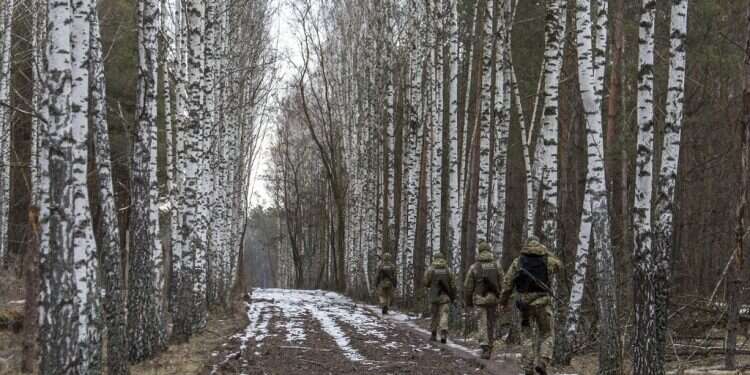Russian President Vladimir Putin convened top officials Monday to consider recognizing the independence of separatist regions in eastern Ukraine, a move that would ratchet up tensions with the West amid fears that the Kremlin could launch an invasion of Ukraine imminently.
Follow Israel Hayom on Facebook, Twitter, and Instagram
The meeting of the presidential Security Council comes amid a spike in skirmishes in eastern Ukraine that Western powers believe Russia could use as a pretext for an attack. Sustained shelling continued Monday in the long-running conflict between Ukrainian government forces and pro-Moscow separatists.
Leaders of the separatist regions released televised statements earlier Monday pleading with Putin to recognize them as independent states and sign friendship treaties envisaging military aid to protect them from what they described as an ongoing Ukrainian military offensive. Russia's lower house of parliament made the same plea last week.
Ukrainian authorities deny launching an offensive and accuse Russia of provocation amid intensifying shelling along the line of contact that separates the two sides.
The Kremlin initially signaled its reluctance to recognize the regions as independent, arguing that would effectively shatter a 2015 peace deal for eastern Ukraine that marked a major diplomatic coup for Moscow, requiring Ukrainian authorities to offer broad self-rule to the rebel regions. But Putin argued Monday that Ukrainian authorities have shown no appetite for implementing the deal.
The meeting comes after the US and Russian presidents tentatively agreed to meet in a last-ditch effort to stave off a possible invasion of Ukraine.
Amid the hopeful signs, there were also worrying ones. Starting Thursday, shelling spiked along the tense line of contact that separates Ukrainian forces and Russian-backed rebels in Ukraine's eastern industrial heartland of Donbas. Over 14,000 people have been killed since conflict erupted there in 2014, shortly after Moscow annexed Ukraine's Crimean Peninsula.
Ukraine and the separatist rebels have traded blame for massive cease-fire violations with hundreds of explosions recorded daily. On Monday Russia accused Ukraine of sending "saboteurs" as part of an incursion into Russian territory, but Kyiv denied it had troops in the area. Russia claimed to have killed them.
On Friday, separatist officials announced the evacuation of civilians and military mobilization in the face of what they described as an imminent Ukrainian offensive on the rebel regions. Ukrainian officials have strongly denied any plans to launch such an attack.
While Russia-backed separatists have charged that Ukrainian forces were firing on residential areas, Associated Press journalists reporting from several towns and villages in Ukrainian-held territory along the line of contact have not witnessed any notable escalation from the Ukrainian side and have documented signs of intensified shelling by the separatists that destroyed homes and ripped up roads.
Some residents of the main rebel-held city of Donetsk described sporadic shelling by Ukrainian forces, but they added that it wasn't on the same scale as earlier in the conflict.
If Russia invades, as the US warns Moscow has already decided to do, the meeting will be off. Still, the prospect of a face-to-face summit resuscitated hopes that diplomacy could prevent a devastating conflict, which would result in massive casualties and huge economic damage across Europe, which is heavily dependent on Russian energy.
Russia has massed an estimated 150,000 troops on three sides of Ukraine, a western-looking democracy that has defied Moscow's attempts to pull it back into its orbit.
Even as diplomatic efforts inched forward, potential flashpoints multiplied. On top of the alleged incursion and daily skirmishes that have escalated exponentially between rebels and Ukrainian troops, Russia has said it would continue to amass tens of thousands of soldiers on the border, including in Belarus, despite the joint drills being completed.
Moscow denies it has any plans to attack, but wants Western guarantees that NATO won't allow Ukraine and other former Soviet countries to join as members. It has also demanded the alliance halt weapons deployments to Ukraine and roll back its forces from Eastern Europe — demands flatly rejected by the West.
With the prospect of war looming, French President Emmanuel Macron scrambled to broker a meeting between US President Joe Biden and Putin.
Macron's office said both leaders had "accepted the principle of such a summit," to be followed by a broader meeting that would include other "relevant stakeholders to discuss security and strategic stability in Europe."
The language from Moscow and Washington was more cautious, but neither side denied a meeting is under
Kremlin spokesman Dmitry Peskov told reporters Monday that Putin and Biden could meet if they consider it "feasible," but emphasized that "it's premature to talk about specific plans for a summit."
Subscribe to Israel Hayom's daily newsletter and never miss our top stories!




